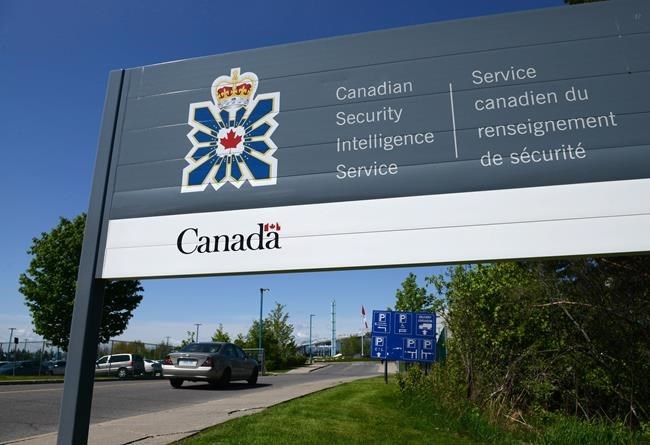OTTAWA — Canadian Security Intelligence Service employees see the spadework needed to obtain a judicial warrant as "a necessary evil" that detracts from more valuable activities, says an independent review that calls for a cultural shift inside the spy agency.
The review, obtained by The Canadian Press, found that ineffective training, excessive secrecy and a generally poor understanding of responsibilities contributed to CSIS failing to meet its obligation of full and frank disclosure to the Federal Court when seeking investigative warrants.
The problems have prompted judges to criticize CSIS for falling short of its "duty of candour" to the court, including a recent case in which the spy agency neglected to disclose its reliance on information that was likely collected illegally in support of warrants to probe extremism.
In September 2019, CSIS director David Vigneault asked Morris Rosenberg, a former federal deputy minister of justice, to conduct an independent review with the aim of addressing the ongoing difficulties.
Rosenberg, who had access to CSIS documentation and employees, examined spy service policies, procedures and operational files, as well as Federal Court transcripts relating to warrant applications.
He also consulted Justice Department lawyers, including those assigned to CSIS, and officials from the National Security and Intelligence Review Agency, a spy agency watchdog.
"While warrants are seen as an essential investigatory tool, work supporting the warrant acquisition process is seen as burdensome and has not been valued in the culture of the Service," Rosenberg concluded.
"Supporting positions are difficult to staff as the role is seen as career limiting in a culture where status and advancement are generally associated with operational roles."
The review says the role of the affiant, a CSIS employee who swears to a supporting affidavit, "is seen as a necessary evil, done on the side of the desk, and taking away from intelligence work."
The Canadian Press recently obtained a redacted version of the secret review, completed early this year, through the Access to Information Act.
Among Rosenberg's other findings:
— Employees' understanding of the duty of candour varies, even among supervisors, with some senior managers unaware of the protocol;
— Inadequate time and resources are allocated for training;
— The role of the Federal Court is not valued or understood, and employees do not understand the reasons for court decisions;
— There were clashes between the duty to be forthcoming with the "need to know culture" at CSIS that emphasizes shielding sensitive intelligence;
— Court findings of a breach of the duty of candour have been followed by inconsistent implementation of corrective measures.
The review urges improvements including better training and clarification of roles, but says they won't succeed without addressing the "cultural issues around warrants."
In a note accompanying the review, CSIS said it agreed with Rosenberg's findings, adding they reveal issues that go beyond the service's disclosure responsibilities with the court.
As a result, Vigneault has launched a project that will draw on the review, consider concerns raised in recent Federal Court rulings and build on other initiatives already underway, the note said.
CSIS spokesman John Townsend said that since the launch of the project in June there has been extensive engagement with employees to solicit ideas.
The project aims to adapt existing policies and practices, as well as provide extensive training to employees, Townsend said.
Training modules developed to date focus on increasing awareness of CSIS's candour requirements as well as clarifying roles and responsibilities for operational employees, affiants and counsel, he said.
In a ruling made public in July, Federal Court Justice Patrick Gleeson found CSIS had breached its duty of candour to the court in probing extremism, part of a troubling pattern dating back years.
“Having approved operations that were on their face illegal, the service then collected information which in turn was put before this court in support of warrant applications, without notifying the court of the likely illegality,” Gleeson’s ruling said.
“The circumstances raise fundamental questions relating to respect for the rule of law, the oversight of security intelligence activities and the actions of individual decision-makers."
This report by The Canadian Press was first published Oct. 13, 2020.
Jim Bronskill, The Canadian Press



